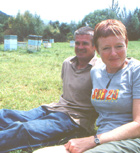Recent surveillance of the South Island of New Zealand has found no varroa mites. But beekeepers in the top of the South Island have little to rejoice about this season.
Varroa mites were first discovered in 1903 in Java, then a few years later in Singapore, then Hong Kong, China, Eastern Europe, USA in 1987 and then on April 13th 2000, south Auckland.
New Zealand's 4,539 beekeepers, 21,304 apiaries and their 314,091 hives, which produced 9,144 metric tonnes of honey in the 2000-01 season, were suddenly at serious risk. When the varroa mite hit the island of Malta it decimated bee populations leaving just 4% remaining, to ultimately reinfest the newly introduced hives. Not a pretty picture when so much of New Zealands export horticulture relies on adequate pollination.
Paul Davey and Brenda Wraight of Davey-Wraight Beekeeping, are producers of Orinoco Honey, and are in their seventh season, servicing the pollination needs of 40-45 clients with 520 hives from their Orinoco base. Normally they extract honey from their hives for three months of the year, a relatively small proportion of their business. "At the moment it's looking like we won't get any honey at all this year, however there is still some from last years bumper crop for some of our regular customers," Paul comments.
Brenda's parents, from whom they took over the business, had been in the trade for 30 years and have described this year as the worst they had seen. Last week Paul was checking the levels of stored honey in the hives and in most cases was having to feed them to enable the hives to survive through the coming winter months.
Paul prides himself on the quality of his own hives and ensured only strong hives were put out in the field to pollinate orchards. Due to this years adverse weather conditions, Paul feels that this pollination season may highlight quality beekeeping practices.
"You only get one shot at pollination, so it's pretty important," Paul assured.
NOTE: Since the artlcle was published, Paul and Brenda have extracted their 2002 honey crop.
Whilst the volume is down on previous years, particularly in the meadow and rata honeys, they have been pleasantly surprised by yields of high quality manuka and beech honey dew. Click here for more details.
